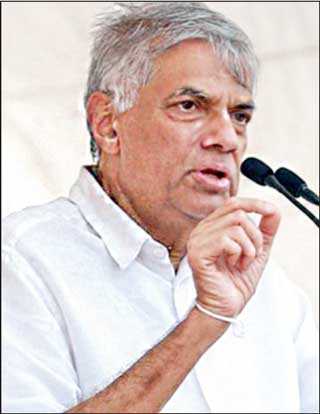Sunday Feb 22, 2026
Sunday Feb 22, 2026
Wednesday, 15 July 2020 00:00 - - {{hitsCtrl.values.hits}}
The United National Party barely needs an introduction to anyone who is a follower of Sri Lankan politics. Since the party was founded by the first Prime Minister of Sri Lanka (then called Ceylon), D.S. Senanayake in 6 September 1946, it has held power for 36 of the 72 years of post-independence Sri
 |
UNP Leader Ranil Wickremesinghe |
Lanka.
Six of those years in power were technically a coalition government as they were under SLFP presidents. The party has a proud history as it has produced six heads of government. They are, namely, D.S. Senanayake, Dudley Senanayake, Sir John Kotelawala, J.R. Jayewardene, Ranasinghe Premadasa and D.B. Wijetunga. However, Ranasinghe Premadasa was the last elected head of Government from the UNP as D.B. Wijetunga was only completing Premadasa’s term after he was assassinated by the LTTE in May 1993.
Unfortunately for the party, they have not been able to be in complete government control since 1994. It is fair to say that the party bore the worst of the LTTE terror as they lost several stalwarts, namely, Ranjan Wijeratne, Lalith Athulathmudali, Ranasinghe Premadasa, Gamini Dissanayake, Gamini Wijesekara, GM Premachandra, Weerasinghe Mallimarachi, etc.
Ranil Wickremesinghe at the helm
Due to all those assassinations, it was Ranil Wickremesinghe who like the boy on the burning deck had to take over the party leadership, when it was fair to say he was the only suitable one for the position after all the carnage the Tigers had caused. The party never recovered from the leadership vacuum  caused by those assassinations. To this day Ranil has been leading the UNP and he will be completing 26 years as Party Leader in November.
caused by those assassinations. To this day Ranil has been leading the UNP and he will be completing 26 years as Party Leader in November.
Since Ranil took over the leadership he has lost two Presidential Elections (1999, 2005), didn’t contest on three occasions (2010, 2015 and 2019), and of the three occasions on two of them (2010, 2015) he didn’t allow another party member to contest either. He instead gave the candidacy on a platter to an outsider. In addition to that the party has lost three Parliamentary Elections under his leadership (2000, 2004, 2010). Furthermore, the party has lost several Provincial Council and Local Government Elections and the total of all election defeats under the Wickremesinghe leadership exceeds 30.
The UNP won two elections in 2001 and in 2015 but even on those occasions that he was able to form a government, it was a troublesome coalition agreement with an SLFP president. The Government from 2001-2003 was particularly chaotic and it was prematurely ousted by then President Chandrika Kumaratunga. The Government from 2015 to 2019 started off somewhat positively but then the relationship between President Sirisena and Ranil became very strained from around 2018 onwards.
During the course of his leadership tenure, he has faced several internal rebellions against his leadership, particularly since his defeat in the Presidential hustings in 2005. However, despite clear opposition against his leadership from a vast majority of elected representatives from the UNP from 2005 to this date, he still continues to remain leader. The party suffered a debilitating split in March this year, worse than any other split they had suffered before. A majority of the former Parliamentarians elected under the UNF ticket in the previous Parliament will be contesting under the SJB ticket in the forthcoming Parliamentary Elections.
UNP leadership
Now let’s examine as to why the UNP hasn’t been able to democratically change its leadership since Wickremesinghe took over despite continuous opposition to his leadership. Since the very inception of the UNP in 1946, the main decision-making body of the UNP is its Working Committee. This committee has always been appointed entirely by the leader and it is in charge of appointing all positions in the party and has the authority to amend the Party Constitution. The Party Convention only formalises such decisions made by the Working Committee and a formal voting process for any leadership position or any constitutional amendment has not taken place at the Party Convention. Basically the Working Committee decisions are final.
Many UNP stalwarts have referred to the 1995 Party Convention in Kataragama as the point when UNP lost its internal democracy. Wickremesinghe had stacked the Working Committee with his loyalists soon after he took over leadership in November 1994 and then gotten them to vote for the infamous article 8.1 which read as follows: “The National Executive Committee shall elect the leader of the party when there is a vacancy. Such power may be delegated by a resolution of the National Executive Committee to the party Working Committee.” (Perera, 2010)
Before this provision was introduced to the Party Constitution, the provision to elect the leadership read as follows: “All main office-bearers including the leader of the party to be elected annually at the Annual
Conference (presently called Annual Convention).” (Perera, 2010)
This was of course when the President was not a UNP member; if he was a UNP member then he would be the leader of the UNP as well, that’s a provision that was introduced by late President J.R Jayewardene. However, as I had stated previously in this article, the Party Convention, in practice only formalises Working Committee appointments and cannot make decisions. Therefore, my argument is that, regardless of the amendments introduced in 1995, Ranil would still be UNP Leader as he has always commanded majority support in the Working Committee as it is he who appoints its members. Article 8.1 was just to ensure that in the highly unlikely scenario of him losing support of a majority of the Working Committee, that he could not be ousted.
After severe criticism against the leadership of Wickremesinghe, he was eventually pressured to make amendments to the Party Constitution and it was partially democratised in 2010. Several amendments were introduced in 2010. That was when the following clause was introduced to the Party Constitution: “8.2 In the event of any competition for such office, members of the working committee and the members of parliament of the United National Party who are members of the parliamentary group shall elect such office-bearers by secret ballot. Members of Parliament of the United National Party shall mean only those who have been elected or nominated as members of parliament while holding the membership of the party but shall not include any member of Parliament either elected or nominated to Parliament on the party name or symbol in furtherance of an electoral alliance but who is not a member of the United National Party. Where a member of the party Working Committee is also a member of the party Parliamentary Group, he shall have only one vote. Where a member of the party Working Committee is also a member of the party Parliamentary Group, but the party Working Committee has made a determination under Article 13.7, he shall not have any vote.” (Perera, 2010)
Working Committee: The bane of the UNP
However, the above clause never really addressed the problem as the Working Committee was a part of the caucus for the secret ballot and since its membership is appointed by the leader, it would always give a huge bias to the incumbent leader in the case of there being no consensus among the Working Committee and if it goes to a vote among the Working Committee and the members of Parliament of the UNP. As such in the only election for party leadership which took place under this clause in 2011, which was Ranil Wickremesinghe vs. Karu Jayasuriya, Ranil recorded a comfortable victory. So though there was strong opposition to Wickremesinghe from the elected representatives due to the advantage he had from the Working Committee, he won comfortably.
Another important factor to mention was that the 2010 amendments, increased the Working Committee from 50 members to 92 members. This further increased the authoritarian powers enjoyed by the party leader. What followed in the 2012 convention was beyond appalling. Wickremesinghe introduced a provision to elect leadership once in six years. That too when there was no consensus among the Working Committee, which makes even a leadership change once in six years a pipe dream. So it is very clear that the bane of the UNP has been the Working Committee system which has not allowed a democratic process to elect the party leadership. That very system has also helped the leadership to introduce bizarre amendments to the Party Constitution in 1995 and 2012 as stated above. It is really sad that a supposedly right of centre political party has a party constitution similar to that of a Marxist party. Eventually, the UNP which has suffered due to a serious lack of intra-party democracy, led to the formation of the SJB. The UNP story should be a case study for political parties not just in Sri Lanka, but around the world about the importance of having a highly democratic party constitution so that tyrants such as Ranil Wickremesinghe will not emerge in any mainstream political party.
It is up to the SJB to lead by example and establish a party constitution similar to that of the Conservative Party (UK) or the Liberal Party (Australia) so that it would not face a similar fate as that of the UNP.
[The writer is a graduate in Business Administration from Northwood University, Michigan and is currently following a Post Graduate Diploma in International Relations at the BCIS (Bandaranaike Centre for International Studies) He is also the maternal great grandson of Dr. C.W.W. Kannangara.]
References
https://www.apiunp.com/history/
https://www.nation.lk/2010/12/19/newsfe2.htm